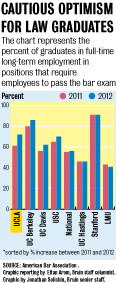A recession that dings job prospects for highly educated professionals hits close to home for UCLA students, many of whom are preparing for legal, business or medical careers.
In the legal market particularly, there seems to be a frightening surplus of available labor. Almost 50 percent of new law graduates nationally are unable to find work that requires passing the bar exam, according to the most recent data from the American Bar Association.
In response to these numbers, some scholars, journalists and legal professionals are calling on law schools to cut the number of admitted students. But for law schools to respond by cutting admissions hurts students who are applying now in the hopes of becoming lawyers for the rest of their lives.
Markets are transitory, but professional degrees are not.
In planning for the future, law schools would do well to recognize that fact. But a move last year by the University of California Hastings College of the Law to permanently cut the number of admitted students by 20 percent runs contrary to that principle. It is joined by other prominent schools, such as the George Washington University and Northwestern University School of Law, in slashing admissions numbers.

Undergraduates currently applying to law school are put at a disadvantage relative to students applying a few years ago. Given that the current scarcity of legal jobs is somewhat temporary, these schools are unfairly handicapping students who will presumably be practicing for many decades. Odds are, for much of that time, the job market will look very different from what it does today.
The admissions cutback at UC Hastings College of the Law, a stand-alone law school located in San Francisco, is in response to a reduction in the number of jobs requiring or preferring a J.D., said Greg Canada, assistant dean for admissions at UC Hastings College of the Law. Canada said that the school has a responsibility to not feed a surplus of law degrees relative to employment positions needing those degrees.
However, the move by UC Hastings College of the Law is a significant and public bet that legal jobs that disappeared during the recession are not coming back and that structural adjustments in the law market have permanently reduced the number of law degrees society needs.
But with the recession barely behind us, it is too early to tell. It is certainly too early to roll the dice in the manner that UC Hastings College of the Law seems to have done.
Indeed, the legal market seems to be picking up all on its own. At UCLA, the percentage of graduates employed in bar-required, full-time positions nine months from graduation bottomed out at 61.3 percent for the class of 2011. The percentage rebounded into the 70s for the class of 2012. While UC Hastings College of the Law experienced a stagnant hiring rate over those years, many other prominent California schools saw a rebound similar to the one at UCLA.
“Things are looking better certainly than they did at the bottom of the market,” said Beth Moeller, assistant dean for career services at the UCLA School of Law. “We’re cautiously optimistic that things are moving in the right direction.”
Unfortunately, that cautious optimism has not spread north to the UC Hastings College of the Law campus. In October, Frank Wu, UC Hastings College of the Law chancellor and dean authored an article for the Huffington Post boldly titled “Shrinking Law Schools.”
“Law schools must reduce their J.D. class sizes,” he wrote. “They should do so immediately and permanently.”
Wu, who was not available to comment, surely has the best interests at heart – to protect students who spend hundreds of thousands of dollars on a J.D. only to work menial jobs. But a brash admissions cut, against a background of ailing employment numbers, creates a sense of panic, hurting both current and prospective law students.
And though the prospects for law graduates are none too rosy at the moment, law schools have no obligation to react to a market surplus by reducing enrollment by a set number.
While a surplus of labor is harmful for young lawyers, the problem of too many lawyers should correct itself by compelling some undergraduates not to attend law schools. Indeed, law school applications show exactly that: the number of students applying to J.D. programs fell by over 100,000 between 2011 and 2013, according to the Law School Admission Council.
In bear markets as in bull markets, law schools should admit the students who meet their criteria and reject the ones who do not. Law schools have no moral imperative other than to admit students based solely on merit and let the numbers sort themselves out.
If the employment situation stays sluggish, proving itself to be more than a temporary phenomenon, law schools can and should react by scaling down class sizes. But until then, those cutbacks are detrimental for the current generation of aspiring lawyers.
John Rafael, who graduated from UCLA in 2012 and plans to attend the UCLA School of Law in the fall, said the current job market did not affect his career decision.
“I’m a lawyer for the next 50, 60 years,” Rafael said. “That the market is bad today will not affect the rest of my life.”
Current undergraduates planning for their futures shouldn’t be spooked by fleeting trends in the employment data. And to be sure, neither should law school deans.
Email Arom at darom@media.ucla.edu. Send general comments to opinion@media.ucla.edu or tweet us @DBOpinion.
